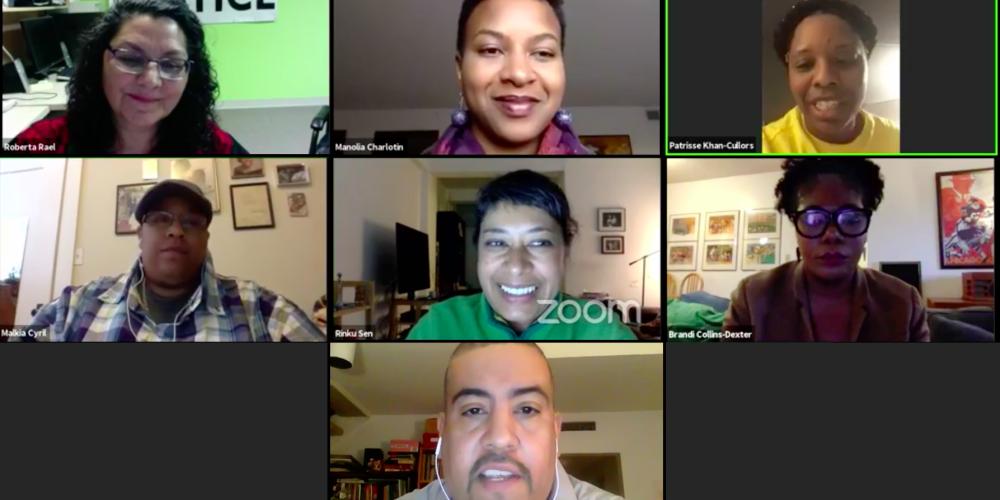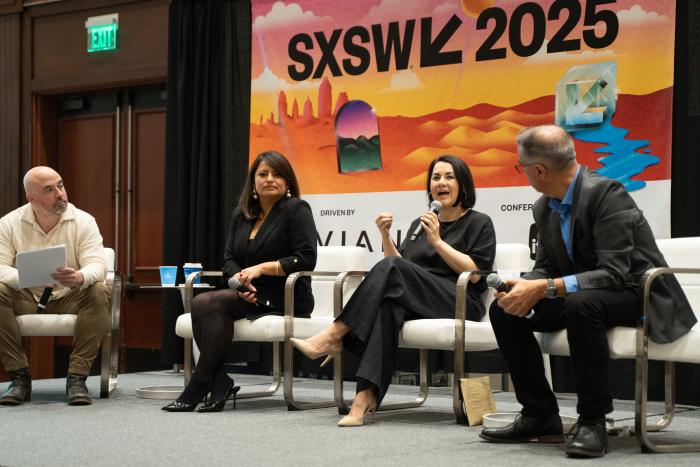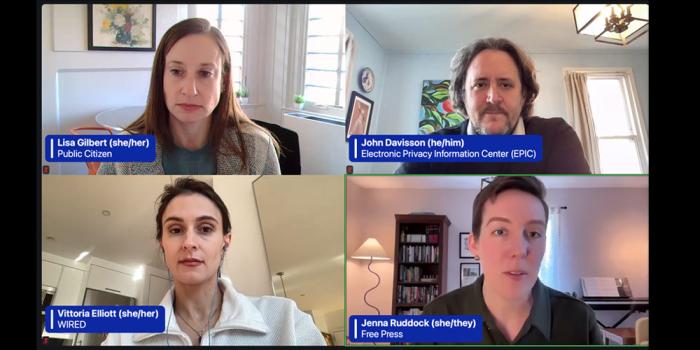20 Powerful Comments on Race, the Media and #KernerAt50

Earlier this month, Free Press and Color Of Change hosted a virtual town hall to discuss the 50th anniversary of the Kerner Commission Report — a landmark publication that examined the media’s role in perpetuating racial divisions, which had come to a head with a series of rebellions across major U.S. cities in the late 1960s.
The #KernerAt50 panel featured Black Lives Matter co-founder Patrisse Cullors, Center for Media Justice Executive Director Malkia Cyril, Color Of Change Senior Campaign Director Brandi Collins-Dexter, Generation Justice Director Roberta Rael and former Executive Director of Race Forward Rinku Sen.
The discussion, which multimedia strategist Manolia Charlotin moderated, began with remarks from Free Press Senior Director of Strategy and Engagement Joseph Torres.
If you didn’t get to attend, don’t worry: Watch and share the video now on Facebook, and follow the online conversation using the hashtags #OwningOurStories and #KernerAt50.
Check out these 20 dynamic quotes, which represent our favorite moments from this powerful discussion:
Joseph Torres: “A half century later, the problems outlined in the Kerner Commission Report still exist. It’s hard to achieve racial justice if we’re unable to tell our own stories and control our own narratives. People of color today own too few broadcast stations and even fewer cable networks. And now we’re fighting to protect an open internet by protecting Net Neutrality.”
Malkia Cyril: “The Kerner Report could have gone further. It could have helped us understand that the process of lying about and criminalizing our communities is as old as the nation itself, and has been used within colonization efforts all over the world.”
Roberta Rael: “The media sensationalized the riots [in 1967] just as we see today. In fact, using the word ‘riot’ instead of ‘rebellion’ is a key element of how we look at narrative here at Generation Justice.”
Brandi Collins-Dexter: “While we have to put in place economic-justice policies, the biggest challenge to shifting the assumptions that underlie the things that we fight for is the narrative on poverty. This narrative looks at poverty as an unfortunate condition brought on by poor choices as opposed to an unjust system where decisions made at all levels of society are used to manufacture poverty as a brand.”
Roberta Rael: “Even when we have media makers or journalists of color, they’re not always able to freely tell stories from a community perspective. It’s still very much based on a corporate narrative that is there to maintain the status quo.”
Malkia Cyril: “We’ve seen an explosion of Black people in media, but that face by itself does not inherently change the structural relations of power that produce the criminalization of Black people in this country. Diversity on its own — simply adding people to the conversation — that’s not enough.”
Rinku Sen: “Many great bloggers of color have come up in the last 15 years: Phil Yu, who publishes Angry Asian Man; Damon Young and Panama Jackson, who publish Very Smart Brothas; and Baratunde Thurston, who did a tremendous Twitter thread recently going through the Mueller indictments.”
Malkia Cyril: “Most of us believe knowledge is power, but only power is power. Power comes from owning our media outlets and owning our stories. That’s why I’m out here fighting for Net Neutrality — the power to control our own voice on the internet. That’s why I fight against community-broadband preemption — so local communities can own their stories. These laws and rules are part of the international structural problem in the media.”
Patrisse Cullors: “When you live in poverty, there’s a significant amount of shame. Shame also is a silencer, so much of poor Black life is made up of not telling what has happened to you. This is what we do to protect ourselves. The writing and the sharing become very important.”
Rinku Sen: “The women of color like Carol Jenkins who entered mainstream newsrooms in the 1970s have done us an enormous favor. Because of them we have had great reporters emerge in the last decade, like Rachel Swarns at the New York Times, who broke the story that Georgetown University sold enslaved people to sustain the survival of the institution.”
Malkia Cyril: “When we talk about fake news, we’re not talking about individuals sharing lies. We’re talking about an organized, deliberate effort on the part of resourced communities — the White right — to destabilize our understanding of what is happening in this society.”
Rinku Sen: “The internet has allowed us to really ramp up producing our own media. Colorlines was born in this period, going from 1,200 print subscribers to reaching 1 million. There’s Generation Justice, Indian Country Today and other amazing outlets.”
Patrisse Cullors: “The #TellingBlackStories hashtag is so incredibly important in this moment because as we center Black stories, we get to center a new conversation about changing the material conditions for Black people.”
Rinku Sen: “Reporters need to be able to analyze how power works in their workplaces, and they need to make friends and organize. Not everybody’s great at it, but you’re more likely to get good results if you’re not by yourself. Organizing matters — not just your talent.”
Brandi Collins-Dexter: “Like a lot of people, I had people in my family that went and got job training and were excited to go out into the world. But they would still find that they couldn’t get those jobs, because those employers didn’t see who they were trying to be. All they saw was the superpredator next door.”
Patrisse Cullors: “Right now we’re living in a Black renaissance, from Ava DuVernay to Ryan Coogler and Issa Rae — all Black people who started at the grassroots level — and we’re looking at the work they’ve done to uplift Black stories and realities using their art.”
Brandi Collins-Dexter: “Hollywood and the media at large are forever obsessed with humanizing the White male experience. People of color are often dehumanized: relegated to a footnote, a spectacle or a morality tale. Our own stories are told without us or without our consent, or with a White narrator.”
Malkia Cyril: “There is a power structure in the United States and internationally that created a racial hierarchy in order to maintain the economic hierarchy. Until we dismantle the media that White supremacy built, we will continue to have White supremacy as the output — because that is the input.”
Roberta Rael: “As we move forward in honoring narratives of people of color, we have to really push on journalism schools to step away from believing and normalizing that the Associated Press and the Society of Professional Journalists are the only models that are valid. There are other models of journalism that are equally as valid and maybe even more important to tell the truth and help foster the equality, equity and change that our country needs.”
Joseph Torres: “We’re here today because there’s a long history of struggle and advocacy by people of color to democratize our media system. This is why so many amazing media makers of color exist today.”




